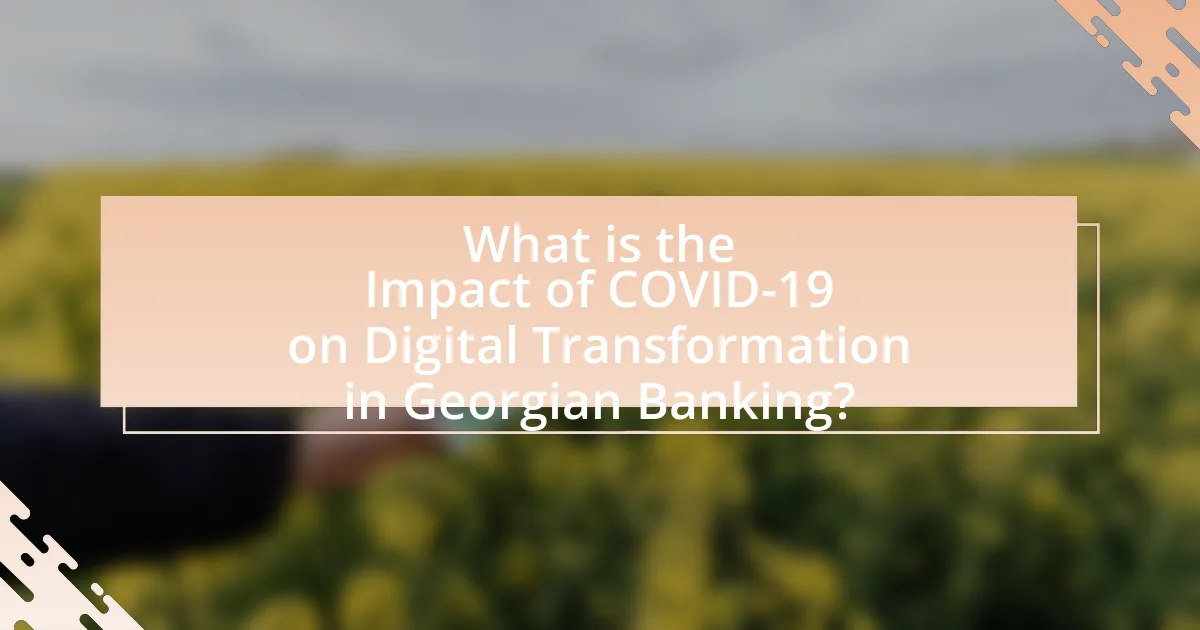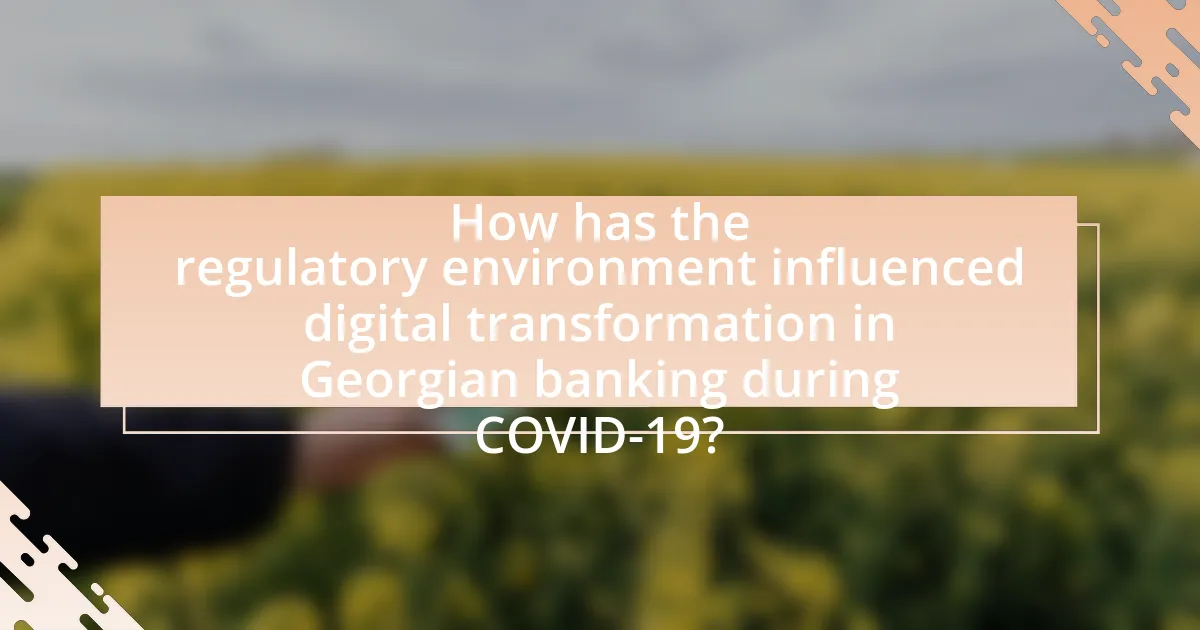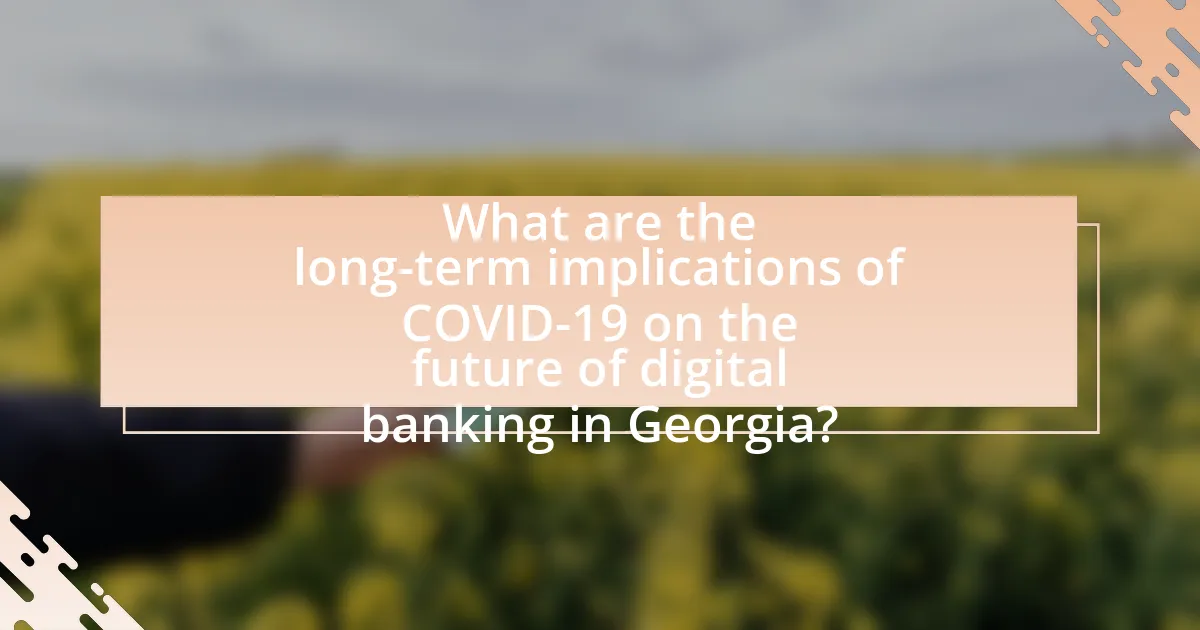The article examines the significant impact of COVID-19 on digital transformation within the Georgian banking sector. It highlights how the pandemic accelerated the adoption of digital services, resulting in a 40% increase in online banking usage and a 30% rise in contactless transactions. Key changes include the enhancement of digital platforms, increased investment in technology, and a shift in customer behavior towards online banking solutions. The article also addresses the challenges faced by banks, such as outdated infrastructure and cybersecurity threats, while exploring the regulatory environment’s role in facilitating digital innovation. Additionally, it discusses the long-term implications for customer expectations and the future of banking in Georgia.

What is the Impact of COVID-19 on Digital Transformation in Georgian Banking?
The impact of COVID-19 on digital transformation in Georgian banking has been significant, accelerating the adoption of digital services and technologies. As physical branches faced restrictions and customer behavior shifted towards online banking, Georgian banks rapidly enhanced their digital platforms to meet increased demand for remote services. For instance, the National Bank of Georgia reported a 40% rise in online banking usage during the pandemic, highlighting the urgency for banks to innovate and improve their digital offerings. This transformation has led to greater efficiency, improved customer experience, and a competitive edge in the banking sector.
How has COVID-19 accelerated digital transformation in Georgian banking?
COVID-19 has significantly accelerated digital transformation in Georgian banking by necessitating rapid adoption of online services and contactless transactions. As physical branches faced restrictions and customer preferences shifted towards digital solutions, banks in Georgia enhanced their digital platforms, leading to a 30% increase in online banking usage during the pandemic. This shift was driven by the need for safety and convenience, prompting banks to invest in technology for mobile banking apps, digital payment systems, and remote customer service solutions. Consequently, the pandemic acted as a catalyst for innovation, pushing Georgian banks to modernize their operations and improve customer experience through digital channels.
What specific changes have been implemented in banking services during the pandemic?
During the pandemic, Georgian banking services implemented significant changes, primarily focusing on digital transformation. Banks accelerated the adoption of online banking platforms, enabling customers to conduct transactions remotely, which increased the usage of mobile banking applications by over 50%. Additionally, contactless payment methods were promoted to minimize physical interactions, leading to a 30% rise in contactless transactions. Furthermore, banks enhanced their cybersecurity measures to protect against increased online threats, reflecting a commitment to secure digital banking environments. These changes were driven by the necessity to adapt to social distancing measures and the growing demand for convenient banking solutions.
How have customer behaviors shifted in response to digital banking solutions?
Customer behaviors have shifted significantly towards increased reliance on digital banking solutions, driven by the need for convenience and safety during the COVID-19 pandemic. A survey conducted by the National Bank of Georgia in 2021 indicated that 70% of customers preferred online banking services over traditional banking methods, reflecting a substantial increase in digital transactions. Additionally, the use of mobile banking apps surged by 50% during the pandemic, as customers sought to manage their finances remotely. This shift demonstrates a lasting change in consumer preferences, with a growing expectation for banks to provide seamless digital experiences.
What challenges have Georgian banks faced during this transformation?
Georgian banks have faced several challenges during their digital transformation, primarily including inadequate technological infrastructure, cybersecurity threats, and regulatory compliance issues. The rapid shift to digital services due to COVID-19 exposed the limitations of existing systems, as many banks struggled to upgrade their technology to meet increased online demand. Additionally, the rise in digital transactions heightened the risk of cyberattacks, necessitating enhanced security measures that many institutions were unprepared for. Furthermore, navigating the evolving regulatory landscape posed difficulties, as banks needed to ensure compliance with new digital banking regulations while adapting to the fast-paced changes brought on by the pandemic.
What technological barriers have hindered digital transformation efforts?
Technological barriers that have hindered digital transformation efforts include outdated legacy systems, lack of integration capabilities, and insufficient cybersecurity measures. Outdated legacy systems often impede the adoption of modern technologies, as they are not designed to support new digital solutions. For instance, many Georgian banks still rely on traditional banking infrastructure, which limits their ability to implement agile digital services. Additionally, the lack of integration capabilities between existing systems and new digital platforms creates silos of information, making it difficult to achieve a seamless customer experience. Furthermore, insufficient cybersecurity measures can deter organizations from fully embracing digital transformation due to fears of data breaches and compliance issues, which are particularly relevant in the banking sector where data security is paramount.
How has the workforce adaptation affected the implementation of digital solutions?
Workforce adaptation has significantly accelerated the implementation of digital solutions in Georgian banking. As employees transitioned to remote work due to COVID-19, banks were compelled to enhance their digital infrastructure to maintain operational efficiency and customer service. For instance, a survey by the National Bank of Georgia indicated that 75% of banks reported an increase in digital transactions during the pandemic, highlighting the necessity for rapid digital transformation. This shift not only facilitated remote banking services but also prompted banks to invest in technologies such as mobile banking apps and online customer support systems, ensuring they could meet the evolving needs of their clients effectively.
What opportunities has COVID-19 created for Georgian banks?
COVID-19 has created significant opportunities for Georgian banks by accelerating digital transformation and enhancing customer engagement. The pandemic prompted banks to rapidly adopt online banking solutions, leading to a 40% increase in digital transactions in 2020 compared to the previous year. This shift allowed banks to streamline operations, reduce costs, and improve service delivery. Additionally, the necessity for contactless services has driven innovation in mobile banking applications, enabling banks to offer more personalized financial products and services. As a result, Georgian banks have strengthened their competitive position in the market by meeting the evolving needs of customers during the pandemic.
How can banks leverage digital tools to enhance customer engagement?
Banks can leverage digital tools to enhance customer engagement by implementing mobile banking applications, personalized communication, and data analytics. Mobile banking applications provide customers with 24/7 access to their accounts, enabling them to perform transactions, check balances, and receive real-time notifications. Personalized communication, facilitated by customer relationship management (CRM) systems, allows banks to tailor messages and offers based on individual customer preferences and behaviors, increasing relevance and engagement. Data analytics enables banks to gain insights into customer needs and trends, allowing for proactive service adjustments and targeted marketing strategies. According to a report by McKinsey, banks that effectively utilize digital tools can increase customer satisfaction by up to 20%, demonstrating the significant impact of these technologies on customer engagement.
What role does innovation play in the future of Georgian banking post-COVID-19?
Innovation is crucial for the future of Georgian banking post-COVID-19 as it drives digital transformation and enhances customer experience. The pandemic accelerated the adoption of digital banking solutions, with a reported 70% increase in online banking usage among Georgian consumers. This shift necessitates banks to innovate in areas such as mobile banking apps, contactless payments, and AI-driven customer service to meet evolving consumer expectations. Furthermore, the National Bank of Georgia has emphasized the importance of fintech collaboration, which fosters innovation and improves financial inclusion. Thus, innovation not only shapes the operational landscape of Georgian banks but also positions them to compete effectively in a rapidly changing financial environment.

How has the regulatory environment influenced digital transformation in Georgian banking during COVID-19?
The regulatory environment has significantly accelerated digital transformation in Georgian banking during COVID-19 by implementing flexible policies that promote digital services. For instance, the National Bank of Georgia introduced measures allowing banks to enhance their digital offerings, such as remote account opening and online loan applications, which were crucial during lockdowns. These regulatory adaptations facilitated a rapid shift towards digital channels, evidenced by a reported 30% increase in online banking usage among customers during the pandemic. This regulatory support not only ensured continuity of banking services but also encouraged financial institutions to innovate and invest in technology, thereby reshaping the banking landscape in Georgia.
What regulatory changes have been introduced to support digital banking?
Regulatory changes introduced to support digital banking include the implementation of the Law on Electronic Communications and the Law on Payment Systems in Georgia. These laws facilitate the establishment of a legal framework for digital banking services, enabling financial institutions to offer online banking solutions more efficiently. Additionally, the National Bank of Georgia has streamlined licensing processes for fintech companies, allowing for quicker entry into the market. These measures aim to enhance competition and innovation in the banking sector, particularly in response to the increased demand for digital services during the COVID-19 pandemic.
How do these regulations impact the speed of digital transformation?
Regulations significantly slow the speed of digital transformation in Georgian banking by imposing compliance requirements that require time and resources to meet. For instance, the introduction of data protection laws necessitates banks to invest in secure technology and processes, which can delay the implementation of new digital services. Additionally, regulatory scrutiny can lead to lengthy approval processes for innovative solutions, further hindering rapid transformation. According to a report by the National Bank of Georgia, compliance with these regulations can extend project timelines by an average of 30%, illustrating the tangible impact on the pace of digital initiatives.
What compliance challenges do banks face with new digital initiatives?
Banks face significant compliance challenges with new digital initiatives, primarily due to evolving regulatory frameworks and the need for data protection. The rapid adoption of digital banking solutions has outpaced the development of comprehensive regulations, leading to uncertainties in compliance with anti-money laundering (AML) and know your customer (KYC) requirements. For instance, the Financial Action Task Force (FATF) has emphasized the importance of adapting AML regulations to address the risks associated with digital transactions, which can vary significantly from traditional banking methods. Additionally, banks must navigate complex privacy laws, such as the General Data Protection Regulation (GDPR) in Europe, which impose strict guidelines on data handling and customer consent. These regulatory pressures require banks to invest in robust compliance frameworks and technology solutions to mitigate risks and ensure adherence to legal standards.
How have consumer protection measures evolved in the context of digital banking?
Consumer protection measures in digital banking have evolved significantly due to increased reliance on online services, particularly accelerated by the COVID-19 pandemic. Regulatory bodies have implemented stricter guidelines to enhance security, such as the introduction of the General Data Protection Regulation (GDPR) in Europe, which mandates transparency in data handling and gives consumers greater control over their personal information. Additionally, the Financial Conduct Authority (FCA) in the UK has emphasized the importance of fair treatment of customers, leading to initiatives that require banks to improve their complaint handling processes and ensure that digital services are accessible to all consumers. These measures are supported by the rise in cybersecurity protocols, including multi-factor authentication and encryption technologies, which aim to protect consumers from fraud and data breaches. The evolution of these measures reflects a broader commitment to safeguarding consumer rights in an increasingly digital banking landscape.
What steps are being taken to ensure data security for online banking users?
To ensure data security for online banking users, Georgian banks are implementing multi-factor authentication (MFA) and end-to-end encryption. MFA requires users to provide two or more verification factors to gain access, significantly reducing the risk of unauthorized access. End-to-end encryption protects sensitive data during transmission, ensuring that only the intended recipient can read it. According to the National Bank of Georgia, these measures are part of a broader strategy to enhance cybersecurity in response to the increased online banking activity during the COVID-19 pandemic.
How are banks addressing fraud risks associated with digital transactions?
Banks are addressing fraud risks associated with digital transactions by implementing advanced technologies such as artificial intelligence and machine learning for real-time transaction monitoring. These technologies analyze transaction patterns to detect anomalies indicative of fraud, allowing banks to respond swiftly. For instance, a report by the International Monetary Fund in 2021 highlighted that banks employing AI-driven systems reduced fraud rates by up to 30% within a year. Additionally, banks are enhancing customer authentication processes through multi-factor authentication and biometric verification, which further mitigates risks. According to a study by the European Central Bank, these measures have significantly improved the security of digital banking platforms, fostering greater consumer trust in online transactions.

What are the long-term implications of COVID-19 on the future of digital banking in Georgia?
The long-term implications of COVID-19 on the future of digital banking in Georgia include accelerated adoption of digital services, increased investment in technology, and a shift in consumer behavior towards online banking. The pandemic prompted banks to enhance their digital offerings to meet the rising demand for remote banking solutions, leading to a significant increase in online transactions. According to a report by the National Bank of Georgia, digital banking transactions surged by over 50% during the pandemic, indicating a permanent shift in consumer preferences. Additionally, financial institutions are likely to continue investing in cybersecurity and digital infrastructure to support this transformation, ensuring that they remain competitive in a rapidly evolving market.
How will customer expectations change in the post-pandemic banking landscape?
Customer expectations in the post-pandemic banking landscape will shift towards greater demand for digital services and enhanced customer experience. As a result of the pandemic, consumers have become accustomed to online banking solutions, leading to an expectation for seamless, user-friendly digital interfaces and 24/7 access to banking services. According to a survey by McKinsey, 75% of consumers have changed their banking habits, with a significant increase in the use of mobile banking apps and online services. This trend indicates that customers will prioritize convenience, speed, and personalized services in their banking interactions moving forward.
What trends in digital banking are likely to persist beyond COVID-19?
The trends in digital banking likely to persist beyond COVID-19 include increased adoption of mobile banking, enhanced digital customer service, and the integration of advanced technologies like artificial intelligence and blockchain. Mobile banking has seen a significant rise, with a 50% increase in users reported during the pandemic, indicating a lasting shift towards convenience and accessibility. Enhanced digital customer service, including chatbots and virtual assistants, has improved customer engagement and is expected to remain a staple as banks focus on personalized experiences. Furthermore, the integration of technologies such as artificial intelligence for fraud detection and blockchain for secure transactions is anticipated to continue, driven by the need for efficiency and security in banking operations.
How can banks prepare for future disruptions in the financial sector?
Banks can prepare for future disruptions in the financial sector by investing in digital transformation and enhancing their technological infrastructure. This approach enables banks to adapt quickly to changes, such as those experienced during the COVID-19 pandemic, which accelerated the shift towards online banking and digital services. For instance, a report by McKinsey highlights that financial institutions that embraced digital channels saw a significant increase in customer engagement and retention during the pandemic. Additionally, implementing robust cybersecurity measures is crucial, as increased digital activity can lead to higher risks of cyber threats. According to the World Economic Forum, 70% of financial institutions reported an increase in cyberattacks during the pandemic, underscoring the need for banks to prioritize security alongside digital innovation.
What best practices can Georgian banks adopt for successful digital transformation?
Georgian banks can adopt several best practices for successful digital transformation, including investing in advanced technology, enhancing customer experience, and fostering a culture of innovation. Investing in advanced technology, such as artificial intelligence and blockchain, enables banks to streamline operations and improve security. Enhancing customer experience through personalized services and user-friendly digital interfaces can increase customer satisfaction and retention. Fostering a culture of innovation encourages employees to embrace change and contribute ideas, which is crucial for adapting to the rapidly evolving digital landscape. These practices are supported by the increasing demand for digital banking solutions, which surged during the COVID-19 pandemic, highlighting the necessity for banks to evolve and meet customer expectations effectively.
How can banks effectively integrate customer feedback into digital strategies?
Banks can effectively integrate customer feedback into digital strategies by utilizing advanced analytics and customer relationship management (CRM) systems to analyze feedback data. This approach allows banks to identify trends and areas for improvement, ensuring that digital offerings align with customer needs. For instance, a study by McKinsey & Company found that organizations leveraging customer insights in their digital transformation efforts can achieve up to 20% higher customer satisfaction rates. By actively soliciting feedback through surveys, social media, and direct communication, banks can continuously refine their digital services, enhancing user experience and fostering customer loyalty.
What role does continuous training play in the success of digital initiatives?
Continuous training is essential for the success of digital initiatives as it equips employees with the necessary skills to adapt to rapidly changing technologies and processes. In the context of Georgian banking, continuous training ensures that staff can effectively utilize new digital tools and platforms, which enhances operational efficiency and customer service. A study by McKinsey & Company found that organizations that prioritize employee training in digital skills are 2.5 times more likely to achieve their digital transformation goals. This correlation underscores the importance of ongoing education in fostering a workforce that can navigate and leverage digital advancements effectively.